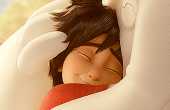EllyB
An English Lit graduate with nerdy interests and a chronic daydreaming problem. Always happy to find new topics to waffle about.
Junior Contributor II
- Articles
1 - Featured
1 - Comments
3
- Ext. Comments
3 - Processed
1 - Revisions
0
- Topics
1 - Topics Taken
1 - Notes
1
- Topics Proc.
0 - Topics Rev.
0
- Points
227 - Rank
X - Score
94
Latest Articles
Latest Topics
Published | Is Fantasy Necessarily Medieval?When we think of the fantasy genre, it's almost always in a swords-and-sorcery way. Knights, enchanters and mythological beings dominate fantasy stories, whether in books (such as a Song of Ice and Fire), TV shows (such as Merlin) and video games (such as the Final Fantasy series). Even fantasy stories set in modern day often betray medieval influences (e.g. Hogwarts castle and the Sword of Gryffindor in Harry Potter). But is this always the case? Are there any high-profile fantasy stories that are not based on/heavily inspired by medieval Europe? Is the fantasy genre branching out into different cultures/time periods, and is this successful?
|
Latest Comments
| Are you a Sub or a Dub? | |
Intriguing article with an apt selection of case studies. I was delighted to see Chrono Trigger mentioned at the end, and it would have been fascinating to see that explored in more detail. Not only is it one of the earliest examples of a time travel paradox game, it also explores other philosophical questions such as euthanasia, fatalism and the existence of a higher being. I also think its take on time travel is deeper and more mature than in Ocarina of Time. Good job on the whole though! | Video Games That Ask Deep Philosophical Questions |
Fascinating contribution. Emma is probably my favourite of Austen’s novels, and the psychological subtleties exhibited in the narrative are a big part of why it’s so engaging. Exploring character judgments through the lens of thin slicing is inspired, and made me reflect on the topic. It’s certainly true, as you say, that Harriet Smith also displays fallible thin slicing, but I think what’s interesting about this is that she gained her techniques from Emma. Towards the beginning we see Emma subtly imparting her judgments about Robert Martin and Mr. Elton to Harriet, which she picks up on. Because both of these are erroneous, this affects Harriet’s ability to thin slice for the rest of the novel. She entirely misinterprets Mr. Knightly’s gallantry, for instance, which leads her to believe that he might be in love with her. Great article. I’d be intrigued to see a follow-up exploring thin slicing in other Austen novels. Marianne’s interpretations of Willoughby and Col. Brandon particularly come to mind here, as well as the eponymous ‘pride and prejudice’ as sources of thin slicing affecting bias. | Thin Slicing in Jane Austen's "Emma" |

Great article. I particularly enjoyed your discussion on Ted Woolsey and the impact of his translations. I know that there are many fans of FFVI and Chrono Trigger (which he gave a similarly dubious localisation) who regard his rendering as the only true rendering, usually because of his original interpretations of characters and their dialogue.
As for the sub vs dub debate, I’m firmly on the side of dubs. While everyone is entitled to their own preferences, I do think a lot of die-hard sub fans tend to forget that subtitles also require a conscious translation that will by definition deviate from the original script.